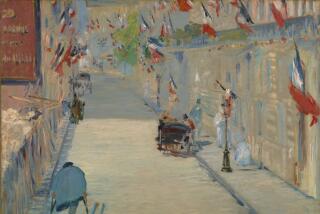Travels With Berlin’s 19th-Century Bohemians : DAGNY, <i> by Mary Kay Norseng,</i> University of Washington Press, $24.95, 219 pages
- Share via
Included on the handsome cover here, but not necessarily as a subtitle, are the words: “Dagny Juel Przybyszewska; the Woman and the Myth.” For those who never heard of the woman, she was born--second of four sisters--into a prosperous Norwegian family and came to adulthood at the turn of the last century. She was fairly serious about playing the piano, and when she was around 25, she set out for Berlin.
There, by a set of circumstances that the author does her very best to make clear, Dagny fell in with a “Bohemian” crowd that included Edvard Munch, August Strindberg and Stanislaw Przybyszewski. These men were--in the last decade of the 19th Century--part of the Schwarze Ferkel (or “Black Piglet”) crowd, so designated because they frequented a tavern of the same name.
“By the time Dagny died at the age of 33, her reputation as the angel/demon of the fin de siecle was so widespread that the thought that she had been anything else took people aback.” So writes Mary Kay Norseng, even as she reminds us that Dagny spent about half her married life to Stach, as everyone called him, safe at home in Norway with her parents and her sisters.
What Dagny did--and I hope I don’t distort the premise of Norseng’s excellent book--was literally and metaphorically to walk unescorted into a bar. That bar was full of artists, writers, half-baked philosophers. They were just young guys , and the idea of a beautiful, intelligent, well-brought-up young lady sent them all spinning. Munch painted her (and her sister, Ragnild) and remained her friend for life.
Strindberg freaked out; he maligned her, was sure she was a witch and a whore and a bad influence all around.
“She has rented a room in a prostitute street,” Strindberg wrote to a family friend, “and is so struck with moral insanity that she too will soon be taken by the police. . . . She destroys families, and” (because of Dagny) “men distressed but with talent, squander money, leave house and home, duties and professions!” When Dagny’s eldest sister heard of this, she hurried to Berlin, only to find Dagny perfectly OK and engaged to Stach.
This book, like Gay Daly’s wonderful history of the Pre-Raphaelite artists and their models, is both marvelous and depressing. As a woman, one doesn’t like to be reminded that many men instinctively react to women (especially strong, beautiful, kind, intelligent women) the way women supposedly react to mice--just screaming eeeek and jumping up on the nearest chair.
It was true then, and it’s true now.
Of course, grown men aren’t supposed to scream eeeek , so they make up myths about women instead. Dagny was “ethereal.” She was so “ethereal,” wrote the troubled young man who finally shot her to death when she was 33, that he was doing her a favor by killing her. She was too good to live!
But at almost the same time, a lackey of Strindberg’s called her an “animal in the muck.” And another one called her an “angel with a cigarette!”
Dagny was a human being, but they couldn’t get that through their thick artistic skulls. She wanted to play the piano; she wanted to write, but wasn’t published until 75 years after her death.
She wasn’t a very good mother. She left her children with her own decorous parents. She was a devoted wife and stuck with her alcoholic, promiscuous, second-rate, Satanic sex fiend of a husband until he dumped her for two other women. “I am dumbfounded, dumbfounded,” she wrote. (But all her family sympathized with him!)
Dagny, the author writes, “tried to be everything: artist, free woman, wife, mother, daughter, sister, friend, literally ‘breaking the boundaries of family within which society restricted her.’ Yet it was she who was broken in the process.” Sound familiar? You bet your boots it does.
Next: Constance Casey reviews “The Dream at the End of the World” by Michele Green (HarperCollins).
More to Read
Sign up for The Wild
We’ll help you find the best places to hike, bike and run, as well as the perfect silent spots for meditation and yoga.
You may occasionally receive promotional content from the Los Angeles Times.






